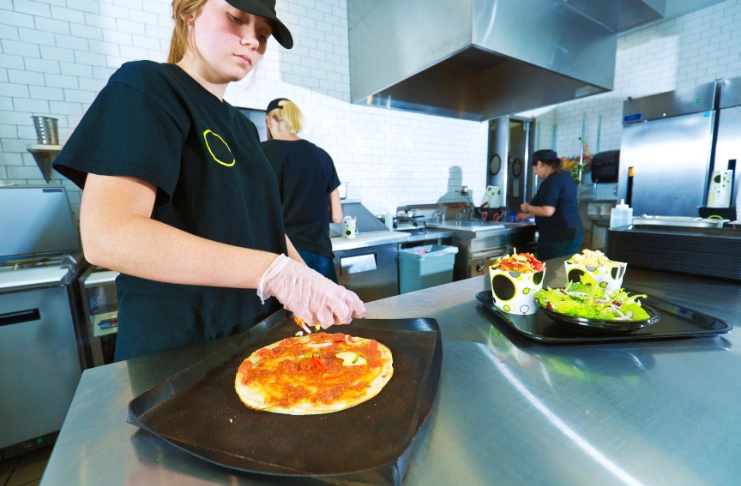High turnover and low morale are chronic issues in the U.S. hospitality industry.
In fact, in 2023, the restaurant industry saw a turnover rate of 74.7%, costing restaurant operators an average of $5,864 per employee in lost productivity and training expenses. Add to it the labor costs that consume around 30% of restaurant revenue, and you’ll know why keeping staff engaged isn’t just a management goal but a financial imperative.
After all, motivated employees are said to deliver better service, make fewer mistakes, and are far more likely to stay. They create an environment that drives repeat business and boosts a restaurant’s reputation.
Now, the question is: How to motivate restaurant staff? This guide answers the same.
Understanding the Challenges Restaurant Workers Face

Restaurant staff face a unique mix of physical, emotional, and structural pressures that affect their motivation and job satisfaction in restaurant operations.
Physically, the job is demanding. Long hours on their feet, constant movement, exposure to heat, and the rush of peak service all take a toll. Despite this, staff are expected to deliver excellent customer service without missing a beat.
Unpredictable schedules add to the strain. Many restaurant employees deal with inconsistent hours, weekend and holiday shifts, and last-minute changes. This makes it difficult to maintain a stable work-life balance and often adds stress to their personal relationships as well.
Then there’s the emotional labor. Restaurant workers are expected to stay calm and friendly, even when dealing with rude or unreasonable customers. Managing these interactions day after day without support can quickly lead to burnout.
Finally, the lack of upward mobility is a major issue. Many restaurant workers feel stuck without clear career paths or structured growth opportunities. That sense of stagnation directly affects job satisfaction and long-term motivation.
Creating a Foundation for Restaurant Staff Motivation

Underneath every high-performing restaurant team is a strong operational core built on clarity, consistency, and culture.
That’s why restaurants must get the basics right before inspiring their staff. That means defining expectations, creating a fair workplace, and fostering an environment where employees want to show up. Here’s how to build that foundation.
Clear Expectations From Day One
Your team can’t hit targets they can’t see. Make sure everyone understands exactly what their job involves through detailed job descriptions. Set realistic performance goals so staff know what success looks like in their role, and help them see how their work contributes to the restaurant’s overall success.
Creating a Workplace People Want to Be In
The atmosphere of your restaurant significantly impacts how staff feel about coming to work. Create an environment where people feel comfortable speaking up without fear and where conflicts get addressed quickly and fairly.
When diversity is genuinely valued, and staff respect each other’s contributions, your restaurant becomes a place where people want to work, not just where they have to work.
Pay That Makes Sense
While money isn’t everything, it’s definitely something. Research what competitors are paying and match or beat it if possible. Implement transparent tipping systems that everyone understands and trusts. Consider:
- Performance bonuses that are achievable
- Giving adequate schedule notice so people can plan their lives
- Fair compensation for specialized skills or responsibilities
Practical Motivation Strategies for Restaurant Staff

Once the foundation is in place, restaurant managers need practical, day-to-day strategies that keep teams motivated and engaged, especially in a high-pressure, fast-moving industry like hospitality. So, here’s what will help:
Recognition That Means Something
Generic “good job” comments don’t cut it. Meaningful recognition acknowledges specific actions and shows you’re paying attention. Try employee of the month programs with valuable rewards (not just a certificate), and encourage peer recognition systems where staff can highlight each other’s great work.
When you see something impressive, offer immediate verbal praise, and with permission, provide public acknowledgment in team meetings or social media.
Team Building That Doesn’t Feel Forced
Skip the awkward trust falls. Instead, create organic opportunities for your team to connect:
- Staff meals before or after shifts, where people can relax together
- Friendly competitions between departments (bar vs. kitchen challenges)
- Occasional off-site events like cooking classes or food tours
Community service projects bring the team together for a good cause while building camaraderie that carries over into service hours.
Making Work-Life Balance Possible
In an industry notorious for brutal schedules, supporting work-life balance makes a huge difference. Create predictable schedules people can plan around and allow flexible shift swapping when life happens.
Providing adequate paid time off shows you value your team as people, not just workers, and ensuring holiday rotations are fair prevents resentment from building among staff.
Professional Growth Opportunities

Good training does more than prepare employees—it shows you’re invested in their success. A thorough orientation for new hires sets them up to succeed from day one, while regular skill refreshers keep things interesting for veterans.
Consider cross-training in different positions to build versatility and understanding between departments.
When staff can see a future with you, they stick around longer. Document clear promotion paths and create stepping-stone positions between entry-level and management.
Internal management training programs signal that you prefer promoting from within, and mentorship pairs help transfer knowledge while building relationships across experience levels.
Leveraging Technology
Invest in user-friendly POS systems and provide proper training to your staff on all restaurant technology. Systems that improve kitchen-to-server communication reduce conflicts, and getting staff input when selecting new tools ensures you’re solving real problems.
Technology can also enhance recognition. Consider:
- Mobile apps for immediate peer recognition
- Digital leaderboards for friendly competition
- Social media spotlights for standout employees
These approaches to recognition can energize your team and create a positive atmosphere of achievement.
Smart Financial Incentives

Beyond basic pay, thoughtful financial incentives align staff goals with business success. Fair tip pooling systems encourage teamwork and enhance service quality, while shift premiums make less desirable times more attractive. Performance-based bonuses tied to clear metrics give staff concrete targets for which to aim.
Mind that sometimes, the most appreciated benefits aren’t cash. Free or discounted shift meals ensure staff are energized and can personally vouch for the food.
Staff dining discounts when off duty create genuine brand ambassadors, while uniform allowances and transportation assistance address practical challenges that affect reliability.
Building a Management Style That Works
Staff who feel heard are more engaged and motivated. Regular one-on-one check-ins create space for personalized employee feedback, while anonymous suggestion systems allow team members to share ideas without fear. Staff meetings with open discussion time demonstrate that leadership values employee input.
Connect with your team by working alongside them during rushes – this earns respect by showing you understand the challenges they face. Consider personal circumstances when possible and show genuine empathy during difficult situations.
Most importantly, model the behavior you expect from others; your actions set the standard more powerfully than words ever could.
How you deliver feedback makes all the difference in how it’s received:
- Balance criticism with recognition of strengths
- Address issues privately and promptly
- Focus on specific behaviors, not personality traits
- Create improvement plans collaboratively
Creating a Culture of Appreciation

Build appreciation into your restaurant’s routine by highlighting successes in pre-shift meetings and acknowledging exceptional efforts immediately after shifts.
Weekly or monthly recognition events will help create regular opportunities to celebrate achievements, while work anniversary celebrations acknowledge loyalty.
Important: Not everyone wants the same recognition – some prefer public praise, while others find it embarrassing. Take time to learn individual preferences and discover what rewards matter most to different team members. This personalized approach ensures your recognition efforts resonate with each staff member, fostering ongoing career development.
Tracking What Works
Measure the impact of your motivation efforts by watching these key indicators:
- Employee turnover rates
- Absenteeism and tardiness patterns
- Customer satisfaction scores
- Sales performance, especially of items requiring active selling
Regularly collect feedback through employee satisfaction surveys and exit interviews with departing staff.
Stay interviews with long-term employees will reveal what’s keeping your best people around, while anonymous feedback mechanisms provide insights staff might be reluctant to share directly.
Mental Health Matters

The restaurant industry faces higher rates of mental health challenges than many sectors. Create a stigma-free environment for discussing mental health and provide stress management resources.
Train managers to recognize burnout warning signs before they lead to turnover, and implement policies that actively support mental wellbeing such as reasonable shift lengths and adequate staffing levels.
INDUSTRY INSIGHT
| The U.S. restaurant industry is grappling with an unprecedented burnout crisis. A 2024 study revealed that 47% of restaurant managers reported experiencing burnout, with nearly 70% acknowledging that their team members have voiced similar concerns. Despite this, only 46% of companies offer any training around mental health and well-being. Compounding the issue, the median hourly wage for servers, including tips, hovers around $17–$18, while base wages in several states remain as low as $2.13. These factors contribute to high turnover rates, with many employees leaving due to unsustainable working conditions and inadequate support. Addressing these systemic issues is crucial for retaining talent and ensuring the long-term success of the hospitality industry. |
So, How to Motivate Restaurant Staff?
Creating a motivated restaurant team isn’t a one-time effort. It’s an ongoing commitment to your people. By implementing strategies that show staff they’re valued, providing opportunities for growth, and building a positive culture, you’ll reduce costly turnover while creating a place where people actually want to work.
Remember: your people are your most valuable asset. Invest in them, and they’ll invest in your restaurant’s success.
Frequently Asked Questions
1. How to motivate a restaurant team?
Create a positive environment with fair pay, clear expectations, and regular recognition. Provide growth opportunities through training and promotion paths. Build team spirit with staff meals and celebrations. Address problems quickly.
Most importantly, lead by example – work alongside your team during rushes and embody the service standards you expect from them.
2. How to incentivize restaurant employees?
Mix short-term rewards with long-term benefits. Financial incentives work: sales contests, efficiency bonuses, and attendance rewards.
Non-monetary incentives matter too: preferred shifts, schedule flexibility, meal benefits, and public recognition.
The key is consistency – incentives that come and go quickly lose their effectiveness.
3. What is the most effective way to motivate staff?
Combine respect, recognition, and opportunity. Treat staff as professionals, listen to their input, and acknowledge their challenges. Recognize specific contributions rather than giving generic praise. Provide clear paths for advancement in skills, responsibilities, and pay. These create internal motivation rather than dependence on external rewards.
4. What is a motivational quote for restaurant workers?
“Great service isn’t just what we do—it’s who we are. Every plate, every table, every smile creates experiences people remember long after the meal ends.”
5. How to motivate employees in a restaurant?
Focus on fundamentals: competitive pay, thorough training, and a positive environment. Recognize achievements consistently. Schedule reasonably to prevent burnout. Invest in quality equipment that makes work easier.
Show genuine appreciation for your team’s challenging work, and address problems quickly before they affect morale.
6. How might a restaurant retain its staff?
Pay competitive wages with loyalty increases. Create predictable schedules that respect work-life balance. Develop clear advancement paths. Build a positive culture where staff feel valued. Address workplace issues promptly. Conduct “stay interviews” with long-term employees to understand what keeps them and replicate those factors for others.
7. How do you manage restaurant staff well?
Set clear expectations with comprehensive training. Address performance issues privately; celebrate excellence publicly. Be visible during service, working alongside your team when needed. Handle conflicts fairly. Create efficient systems that reduce stress. Schedule appropriate staffing levels. Remember that your team consists of individuals with unique strengths and circumstances.
8. How do you motivate staff in a restaurant?
Create a workplace where everyone feels respected and valued. Recognize excellent performance. Offer competitive pay with advancement opportunities. Foster team spirit through staff meals. Implement reasonable scheduling practices. Address workplace challenges promptly. Show appreciation for their demanding work, and lead by example during busy periods.
9. How do you motivate staff effectively?
Understand what drives each employee—some want financial rewards, others recognition, advancement, flexibility, or belonging. Be specific with praise. Address workplace frustrations quickly, like broken equipment or inefficient systems.
Combine immediate recognition for daily excellence with longer-term rewards for loyalty and improvement. Above all, be consistent to ensure that employees feel valued.
10. How to keep restaurant staff motivated and satisfied?
Build a culture of respect and appreciation. Offer competitive compensation with regular reviews. Implement efficient systems and adequate staffing. Listen to concerns and take action. Celebrate both personal milestones and professional achievements. Provide growth opportunities through cross-training—foster team relationships with staff meals, team building activities, and occasional social events.
11. How can employee workplace satisfaction be improved?
Maintain comfortable, safe environments with functioning equipment. Create fair scheduling with adequate notice. Review compensation regularly. Train managers in effective leadership. Welcome staff input on workplace decisions. Recognize achievements. Address toxic behaviors immediately. Balance work demands with appreciation and celebration. Provide clear paths for growth.
12. How to increase employee retention in the restaurant industry?
Hire carefully for cultural fit. Provide thorough onboarding. Pay competitively with scheduled increases. Create predictable scheduling. Develop clear career paths. Offer training opportunities. Implement recognition programs that celebrate loyalty. Build a positive culture where people feel valued. Remember that retention costs less than constantly recruiting and training new staff.





